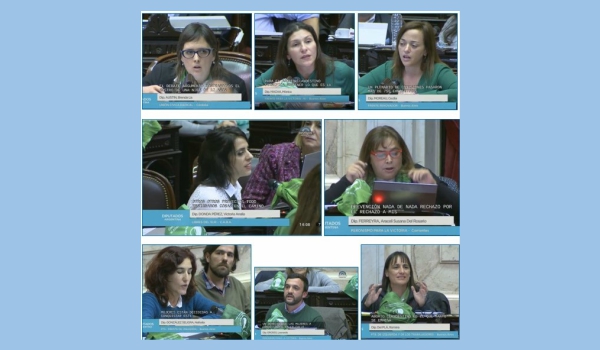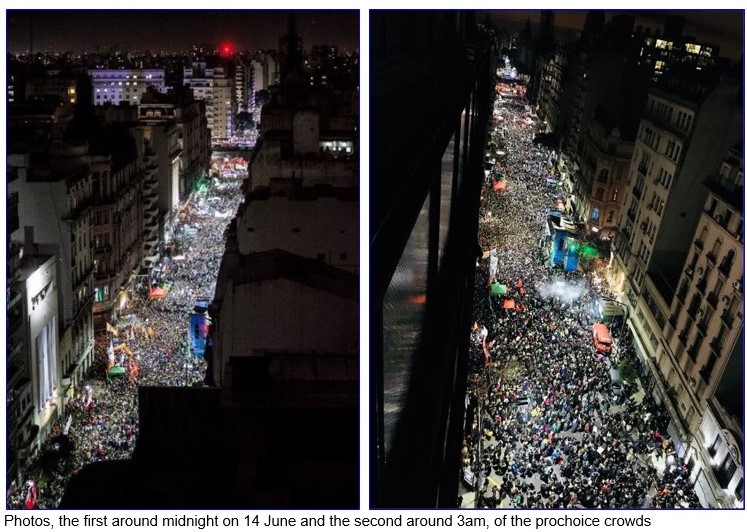
The photos above are of a few of the Deputies in the Argentinian Congress supporting safe, legal, free abortion in the day-long marathon debate on 13 June, with the green scarves of the movement around their necks and on their desks.
The debate started at 11:30am on 13 June, and at that point several of the undecided deputies announced their positions, but it was not yet clear who had the majority of votes. Just after midnight, El Comercio reported that of the 275 deputies, 124 were thought to be against the bill and 126 in favour. Importantly, the report notes, the deputies’ positions for or against the bill, from the first day, were independent of their political affiliations. The bill needs 129 votes of the 257 total to be approved.
Throughout the day and late into the evening, as many as 9,000–12,500 people were listening to the debate live on YouTube, at any one moment. At 4am Argentina time on the morning of the 14th, the debate was still going on, and 40 deputies were waiting to speak. Some 3,000 people were still watching it live on YouTube.
Outside the congress building, El Comercio reports, the streets were full throughout the day and night with both supporters and opponents of the bill, who were going to stay there all night until the vote is taken. The police asked them to occupy the streets on opposite sides of the building, to avoid clashes. A live video with a split screen showed people on both sides wandering up and down, talking, waiting. There were tents and stalls, and on the prochoice side several women who support the legislative proposal were narrating their personal experiences of clandestine abortions for the crowds and the media. Elsa Bonifacio, a woman aged 72, explained to AFP that she was there to “accompany my granddaughters in favour of the decriminalization of abortion, because we are all owners of our own bodies, and we are the ones who should decide”.
But the debate was also taking place in the street:

El Comercio also reports that opponents of the bill interviewed in the street believe they represent the majority of the population. Their placards talk about “protecting both lives”, as if that were possible, indicating that Ireland has taught them nothing. A priest warned that one’s actions led to heaven or hell. What is clear, both inside and outside the congress building, is that for the great majority, neither side has convinced the other of anything, and this debate will not end with the vote today.
Yet, feminist, lawyer and journalist Silvia Buendía argues on Twitter, just after midnight when the photos below were posted, taken from the sky, we need to understand that whatever happens with the vote in Congress today, something huge and indomitable has happened, and that abortion in Argentina has been decriminalised in the streets. Let’s hope she’s right.

We have just learned that on 13 June, Ivana Radicic, Chair of the UN Working Group on discrimination against women in law and practice has written a letter to the Foreign Minister of Argentina, Jorge Faurie, in which the Group emphasises that criminalised abortion “exploits women’s bodies, denies their autonomy and endangers their lives and health”. They congratulate the Argentinian legislature for agreeing to consider the law reform bill and urge them to approve it because “it grants women their human rights.” The letter also insists that “in accordance with international human rights law, religious arguments are not allowable to prevent the adoption of bills because this would violate the human right to religious freedom”. It adds that “the treatment of abortion as a criminal matter often produces harmful side effects, including the imprisonment of women who have had miscarriages, as well as the stigmatisation of women, which in turn produces more discrimination and abuse… The prohibition of self-induced abortion causes even more damage to economically disadvantaged women, whose limited resources increase their chances of unwanted pregnancies, prevent them from accessing any method of safe abortion or to seek treatment due to the complications that may arise, which in turn puts them at greater risk of being criminally prosecuted.”
Back to the Chamber of Deputies: At 8:15am, a deputy spoke movingly about how discussions with his children and other young people, whose futures would be affected most, had convinced him to support law reform, to loud clapping from the room. Following this intervention, it seems other deputies waiting to speak have begun announcing how they will vote. Deputy Daniel Kroneberger’s intervention was particularly moving in support of the bill and what will be needed when the law changes. Magdalena Sierra reminds the room that no woman is asking the state whether she should have an abortion, women are deciding themselves and have always done so; the role played by the state has to be clear about this.
The numbers watching the debate on YouTube have again risen to almost 12,000. It’s 8:43am in Buenos Aires. The president of the Chamber of Deputies has said they will be moving to a vote after the current speaker, whose green scarf decorates his microphone and whose intervention was also excellent. But first, speakers from four “blocks” in the room are summing up. Three of the four quietly but strongly support law reform. Agustin Rossi mentions the history of a young girl refused an abortion whose baby died soon after birth and soon afterwards, so did she. He pays tribute to the women’s movement for putting this issue on the political agenda of the country. He calls for the rights of women to be respected, whether to have a child or not. He says a problem has been made visible. He is incredibly eloquent, as is Silvia Gabriela Lospennato after him. She finishes by reading out the names of many of the women activists who have made this debate happen. Almost 18,000 people are watching. Voting has just begun. 256 people are present, 1 is absent.
The debate has lasted 23 hours.
The vote has just been taken. Yes for law reform, abortion on request up to 14 weeks, 131 in favour, opposed 123. WE’VE WON!!!
Now there are several more clauses, e.g. legal grounds after 14 weeks. The debate on these continues. We will report more tomorrow..
Congratulations!! Venceremos!!!
SOURCES: YouTube Live, 13-14 June 2018 ; El Comercio, AFP report, 14 June 2018 ; Silvia Buendia @silvitabuendia ; Enrique Bonilla @EscritorCritico ; El Comercio, AFP report & gallery of 13 AFP photos in the streets of both supporters and opponents of the bill, 13 June 2018 ; ambito.com, 13 June 2018
And here is a video made in the lead-up to the debate by the Colectivo de Salud Feminista, in Argentina:

VIDEO Legal Termination of Pregnancy



